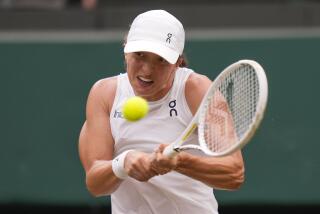Rubin Writes Surprise Ending to Comeback
- Share via
She was there before Martina Hingis, Venus and Serena Williams and found herself in the same age group as Grand Slam winners Jennifer Capriati, Monica Seles and Lindsay Davenport.
It may seem a distant memory, but Chanda Rubin was once considered the logical successor to Zina Garrison as the next great African American star.
Her story certainly isn’t as drama-filled as Capriati’s trip through the wilderness years; nor is she as recognized by one name, like Serena or Venus.
The Rubin story is too tame for something like a “Behind the Music” saga on VH1. But what happened along the way is nothing short of inspirational. To record her setbacks, surgeries and broken body parts, tour officials put out a long list of her injuries before Sunday’s final at the JPMorgan Chase Open.
The final at Manhattan Beach was jokingly called the battle of wounded knee, as No. 12-seeded Rubin defeated fellow surgery survivor, No. 3 Davenport, 5-7, 7-6 (5), 6-3, in 2 hours 19 minutes, rallying from a 4-5 second-set deficit before a crowd of 4,819.
This may have been Rubin’s second championship in 2002, but it was a career highlight for the 26-year-old who had knee surgery in Vail, Colo., days after Davenport in January. In the span of three days last week, she eliminated players who have won a combined six Grand Slam singles titles, beating Serena Williams and Davenport.
Williams is the No. 1-ranked player in the world, and Davenport is actually No. 1 too, with a footnote. The WTA gave her a special ranking of No. 1 because she was ranked that when she suffered a knee injury in November.
Rubin wasn’t buying that oddity, though.
“I really didn’t think she was No. 1,” she said of Davenport. “Can you have two No. 1s? There’s only No. 1. That’s why it’s No. 1.”
She laughed.
The numbers usually don’t lie. So Rubin was brutally honest when she was asked how she was feeling when Davenport served for the title in the second set, leading 5-4, at the Manhattan Country Club.
“I thought my chances were pretty dismal,” Rubin said.
After all, she had lost to Davenport six consecutive times before Sunday, a streak dating to 1996. This time Davenport came within two points of adding a title to her comeback story. Suddenly, Davenport unraveled, double-faulting, hitting a backhand wide and a backhand long to fall back into a 5-5 tie in the second set.
From afar, it might have looked unusual, but Davenport had struggled to close out victories in three other matches while Rubin had unveiled a fighting spirit.
Friday, Rubin came back from a 1-4 third-set deficit to upset reigning French Open and Wimbledon champion Serena Williams in the quarterfinals, ending Williams’ 21-match winning streak.
Sunday, after Rubin got by the 10th game, the players stayed on serve, with Davenport saving two set points, to reach the tiebreaker. Rubin took the tiebreaker’s first four points, and held on, winning on her fourth set point when Davenport netted a forehand return.
The defending champion, Davenport, playing in her third tournament since her knee surgery, lamented her lost opportunities.
“I think this could be the third time here losing in the finals serving for the match,” she said. “I was thinking about that before. I think I served for it against Serena once and maybe even Monica one year and lost them both.”
The final, while high in drama, had its ups and downs. The players combined for 132 unforced errors and 13 service breaks. Rubin had eight aces, and 10 double faults. Davenport had 12 aces and 11 double faults.
Davenport struggled with her serve throughout the tournament. “I’m a little bit disgusted, I don’t want to say I am, but I really am,” she said. “A lot of my game revolves around my serve, and I had absolutely zero rhythm. I just didn’t hit the big serves when I needed to or felt confident I could.”
The third set also was a roller-coaster ride. Davenport’s movement appeared to slow in the heat, and Rubin took a 3-1 lead. They exchanged service breaks, again, before Rubin held to go up 5-3. With Davenport serving, at 3-5, 15-40, Rubin reached her first match point and was frustrated when a Davenport overhead was called good. Davenport erased another match point but lost it on the third, hitting a forehand long.
Rubin was asked if she was grinning about the bad call.
“Was I grinning? That was probably a grimace,” she said. “I don’t think I was happy at that point. There’s not much you can do. It was a close call and everything is tense.”
The long months of rehabilitation have made her stronger, especially since she had been through knee surgery twice in two years.
“I think so. It’s not something I wanted to go through, and I would have loved to have been perfect with my first surgery,” said Rubin, who also had a serious hand injury that required surgery in 1996. “It wasn’t meant to be. I used it to motivate me more. I feel like I’ve worked. I’ve worked overtime twice to get myself back into shape and be fit. I deserve that chance. I worked for it, and I deserve to win these matches.”
She is confident without being overly so, believing she can break into the top five.
Rubin was ranked as high as No. 6 but that was in 1996, which might as well be a different era, considering neither Williams sister played then.
For now, Rubin will savor her success before the U.S. Open, having won 21 of her last 25 matches and two titles. She returned to the tour in May and lost in qualifying in Rome.
“I’m going relax,” she said. “Spend some time with some friends and maybe have a couple of drinks. Don’t tell anybody. I’ll deny it.”
*
The doubles title was won by Kim Clijsters of Belgium and Jelena Dokic of Yugoslavia, beating Ai Sugiyama and Daniela Hantuchova of Slovakia, 6-3, 6-3.
More to Read
Go beyond the scoreboard
Get the latest on L.A.'s teams in the daily Sports Report newsletter.
You may occasionally receive promotional content from the Los Angeles Times.











